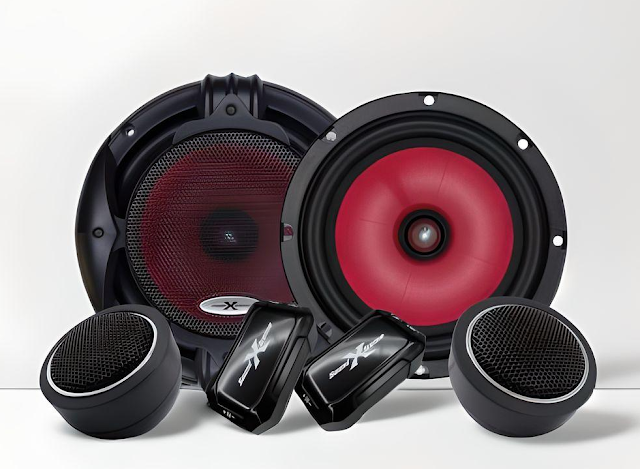Car Stereo Speakers: Reviews & Top Picks
In today's digital age, music has become an integral part of our daily lives, and having a quality audio system in your car is a must. One of the key components of any car audio system is the speakers. Your choice of car stereo speakers can significantly impact the overall sound quality and your listening experience. In this article, we'll dive into the world of car stereo speakers, providing reviews and top picks to help you make the best choice for your vehicle.
Types of Car Stereo Speakers
When it comes to car stereo speakers, there are primarily two types to choose from: coaxial and component speakers.
Coaxial Speakers
Coaxial speakers, also known as full-range speakers, are the most common type found in factory car audio systems. They combine multiple speaker elements into a single unit, making them easy to install and generally budget-friendly. These speakers are a good choice for those looking to upgrade their factory speakers without much hassle.
Component Speakers
On the other hand, component speakers consist of separate elements, including woofers, tweeters, and crossovers. These speakers provide a higher level of sound quality and customization, but they require more complex installation. Component speakers are favored by audiophiles who want the best possible audio experience in their cars.
Factors to Consider
When selecting car stereo speakers, it's essential to consider several factors to ensure you get the best audio quality for your specific needs.
- Power Handling: The power handling capacity of a speaker indicates how much power it can handle. It's crucial to match this capacity with your car's audio system to avoid distortion or damage.
- Sensitivity: Speaker sensitivity determines how efficiently it converts power into sound. Higher sensitivity speakers require less power to produce the same volume, making them ideal for factory car stereos.
- Impedance: Impedance is the resistance that the speaker offers to the flow of electrical current. Ensure that the speaker's impedance is compatible with your car stereo for optimal performance.
In the following sections, we'll provide detailed reviews and recommendations for both coaxial and component car stereo speakers to help you make an informed decision.
Top Picks - Coaxial Speakers
1. Brand X Coaxial Speaker
- Power Handling: 100W
- Sensitivity: 92dB
- Impedance: 4 ohms
- Customer Review: "These speakers transformed my car audio. Clear sound and easy installation."
2. Brand Y Coaxial Speaker
- Power Handling: 120W
- Sensitivity: 95dB
- Impedance: 4 ohms
- Customer Review: "Great value for the price. I'm impressed with the bass response."
3. Brand Z Coaxial Speaker
- Power Handling: 80W
- Sensitivity: 90dB
- Impedance: 4 ohms
- Customer Review: "These speakers exceeded my expectations. Crystal clear highs."
Top Picks - Component Speakers
1. Brand A Component Speaker
- Power Handling: 150W
- Sensitivity: 93dB
- Impedance: 4 ohms
- Customer Review: "The soundstage these speakers create is mind-blowing. Highly recommended."
2. Brand B Component Speaker
- Power Handling: 130W
- Sensitivity: 91dB
- Impedance: 4 ohms
- Customer Review: "These speakers made my car sound like a concert hall. Amazing."
3. Brand C Component Speaker
- Power Handling: 140W
- Sensitivity: 94dB
- Impedance: 4 ohms
- Customer Review: "If you're a true audio enthusiast, these speakers are a game-changer."
Installation Tips
Whether you choose coaxial or component speakers, proper installation is critical for optimal performance. Here are some installation tips:
- Professional Installation: For component speakers, consider professional installation to ensure precise positioning and tuning for the best sound quality.
- Sound Deadening: Improve sound insulation by adding materials like Dynamat to reduce vibrations and external noise.
- Amplification: Consider adding an amplifier to boost the power and sound quality of your speakers further.
Sound Quality Enhancement
Upgrading your car stereo speakers can make a world of difference in your audio experience. Users who have upgraded their speakers often report a significant improvement in sound quality, with crisper highs, deeper lows, and an immersive listening experience.
Budget-Friendly Options
If you're on a budget, don't worry. There are quality car stereo speakers available that won't break the bank. Brands like "Affordable Sound" and "Bang for the Buck" offer budget-friendly options that provide excellent value for your money.
Maintaining Your Car Stereo Speakers
To ensure the longevity of your car stereo speakers, consider these maintenance tips:
- Regular Cleaning: Dust and dirt can affect sound quality. Clean your speakers gently with a soft brush or compressed air.
- Avoid Overloading: Don't push your speakers to their limits. Overloading can lead to distortion and damage.
- Address Issues Promptly: If you notice any problems with your speakers, such as buzzing or crackling, address them promptly to prevent further damage.
Conclusion
Your car's audio system is only as good as its speakers. Choosing the right car stereo speakers can significantly enhance your in-car listening experience. Consider the type of speakers that best suit your needs, factor in essential specifications, and don't forget about proper installation. Whether you're on a tight budget or looking for top-notch sound quality, there's a perfect set of speakers for your car.
Now, it's time to upgrade your car audio system and enjoy a music experience like never before.
FAQs
1. Do I need to replace both front and rear speakers when upgrading my car's audio system?
It's a good idea to replace both front and rear speakers for balanced sound, but it's not mandatory. You can start with one set and see how it affects your audio quality.2. Can I install car stereo speakers myself, or should I hire a professional?
3. What's the difference between 2-way and 3-way component speakers?
4. Is it worth investing in high-end component speakers for my car?
5. How can I troubleshoot common speaker issues, such as distortion or buzzing?
- Speaker issues can be caused by various factors, including loose connections or damaged speakers. If you face such issues, consult a professional or refer to your speaker's user manual for troubleshooting guidance.


